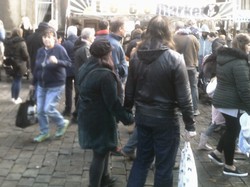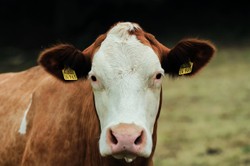I visited the Treacle Fair for the first time yesterday with my wife, son and infant grandson. It was a standard English market with a charter extending back a hundred years,one of the many markets that sprung up in the last millennium.It was held as normal in the town square of a rather normal English town, Macclesfield, in Cheshire, about twenty miles from my home.It is the town where my second son lives.

Macclesfield Treacle Fair
by frankbeswick
The Treacle Fair held every month in Macclesfield has a tradition that goes back for a century
The History of the Market
The Treacle Market has nothing to do with treacle.The name is a little English oddity that began as a nickname and stuck. The story goes that a wagon load of treacle was spilt in the town square sometime in the past, earning the town the nickname of Treacle Town but I think this doubtful. More research is needed. But England is a land of odd traditions, and this is one of them.It is only the name that is odd, the market is a traditional commercial and social event in a small English town overlooking the foothills of the Pennines, the hills that form the spine of Northern England. The market is a jolly sort of place, full of generally friendly people thronging there for commerce, fun and a bit of retail therapy. It is held on the last Sunday of every month, and this was the last before Christmas, so it was more than usually crowded.
Most traditional markets in England were instituted by royal charter in the Middle Ages and although many became redundant in the 1340s, when the plague known as the Black Death struck, they have been running since. The Treacle Market is, however,only a hundred years old. Macclesfield is a town whose name is old English for The Big Field. It is set in a convenient location, for it its centre is set up a hillside, thus preserving it from the threat of flooding. Visitors arriving at the market by train must therefore walk up a short, steep slope which takes them to the town square where the market is centred. It also spreads into the surrounding streets.
The town square contains the small, but impressive Victorian town hall, a reminder of the days when Macclesfield was at the centre of the silk trade. In fact one of the roads running out of the town is called the Silk Road, for it was the route taken by carts taking silk loads to ports for export.
The silk industry is now history,killed off by competition from Asia.The market is a legacy from the time when the town was thriving from silk. It is now a place for traditional craft workers to sell their wares free of the economic constraints of running a shop. Renting commercial property in England is very expensive, well beyond the reach of many small craftsfolk, so getting a stall for a day is financially a more workable option than having a shop. It enables farmers from across the county to sell craft products.
I love this sort of place. It is traditional, but socially progressive, empowering small traders in an economic world dominated by rich people and big businesses. As one who rejects both capitalism and socialism in favour of the New Economics of Schumacher,co-operatives and the Distributism of Chesterton I am in favour of markets that empower small traders. I also love artisan foods, and this is an artisan market. What is not to love?
The Town Crier
 MacclesfieldTown Crier Francis Beswick |
Meeting the Town Crier
We English love tradition, so we hang on to old institutions long after the circumstances of their origin have vanished. One is having a town crier.In the days before newspapers a well-built man with a deep chest and loud voice would be given a ceremonial uniform and a bell.He would ring the bell in public to gain attention and would then read proclamations. Even in modern times some towns maintain a town crier to perform ceremonial duties. Macclesfield has one, and I met him!
Walking through the crowds I spotted a man in ornate eighteenth century attire approaching me. The town crier! He was on his duties of mingling with the crowds to create the right atmosphere for the fair. I saw my chance and spoke to him. He was warm and friendly. I explained about my being a writer for Wizzley and that I was doing an article on the fair. Please could I have a photograph, because my American readers will really be interested in quaint traditions.We British simply live with them.He was delighted to assist, so if you look at the picture above you are seeing a genuine English town crier. Tradition lives! He knows that he is embodying tradition and loves it.
English Cheeses
 |
| British Cheese Assortment (30 ounce) |
Around the Fair
We did not approach up the hill, but came from the other side, as we were visiting my son. He is a real foodie, who enjoys delicacies and cooking his own food. But the main object of his trip was to provide a day out for his son of eighteen months old. He bought a pie and some artisan bread, though he looked at a handmade basketwork box to store some of his son's clothes.
But my path is always the same: look for the pies and cheeses, and for pies I was spoiled for choice. The normal procedure for pie makers is three for ten pounds. Each pie is enough for one person for a meal. I got my ten pounds worth: beef and blue cheese; pork and black pudding; and meat and potato pie.My mother said that I was made of meat and potato pie, for during her pregnancy with me she developed cravings for it, sometime at odd hours of the night. well, sometimes in the early hours of the morning! I had the beef and blue cheese pie today for lunch. Delicious! What lovely pastry.
I found an artisan cheese stall selling a range of Cheshire cheeses. As Macclesfield is a Cheshire town all the local cheeses are varieties of Cheshire.I could have bought a load, but I contented myself with two,an oak-smoked and a blue variety. I got into conversation with the farmer who had made the cheese, from his own cows on his own farm,on the English-Welsh border. The farmer told me that the farm had been in his family since 1930. I told him how I believe in supporting farmers. He seemed pleased. But what of the future? He was an old man. Will his son or daughter follow him. Will they want to? will they be able to? It is not for me to say; and I cannot know.
The street musicians played their merry music and we walked back to my son's house where he was cooking lunch for us.
.
You might also like
A Strong Woman's StoryJane Evans went to War, but fought no one, for her mission was mercy and kind...
Sarn Helen. Through Wales on footSarn Helen is a Roman route which travels Wales from South to North, and the...




 Darkness over the Earth the skies darkened when Jesus was crucified23 days ago
Darkness over the Earth the skies darkened when Jesus was crucified23 days ago
 TheThousand Year Gardenon 11/26/2025
TheThousand Year Gardenon 11/26/2025
 Women of the Gospelson 10/11/2025
Women of the Gospelson 10/11/2025
 Religious Gardenson 08/25/2025
Religious Gardenson 08/25/2025



Comments
I have not heard of this usage. But earl grey may be regarded as a dessert tea, and possibly white tea also.
Thank you!
Unitedstatesian diners sometimes associate certain coffees and teas more as dessert-course drinks than as, for example, breakfast or brunch or lunch or supper main-course or snack-time potables.
Does that happen in the British Isles?
Water and wine with the meal. Tea afterwards
Thank you!
Untedstatesian desserts can be served with coffee or sparkling water or tea or water.
What might have been served as something to drink with the apple crumble?
My family has no such unique recipe. Web tend to follow recipe books.ĺ
Thank you!
Apple crumble makes me think of hopefully a recipe or of possibly a reference in your sister Veronica's wizzleys!
Might your artisanal-food son rely upon a Beswick family recipe that Veronica might use?
APPLE CRUMBLE.
Thank you!
It all sounds like a delicious end to a delightful day.
What would he have served himself, you and Maureen for dessert and drinks and what would he have served his son (your and your wife's grandson)?
(Probably it would have been juice or milk western-pond side-ward!)
Meat, probably pork or lamb, and two vegetables, probably leeks and a mixture of carrot and parsnip.
Your article ends with the filial promise of an in-house-cooked lunch.
What might be favorites that your son mustered up for you and your wife and your grandson?
(Were he an artisan lunch-maker, what would he have worked up to wow parental, filial and grand-filial taste buds?)